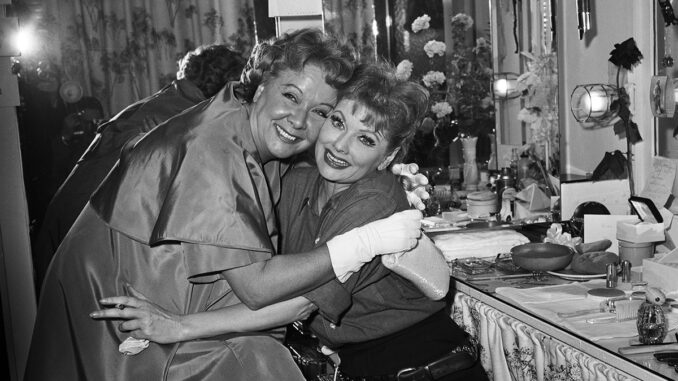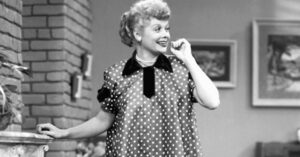
Introduction: The Motherhood Revolution of I Love Lucy
What if I told you that one sitcom from the 1950s didn’t just make people laugh—it reshaped how America viewed motherhood? I Love Lucy, a comedy powerhouse starring Lucille Ball and Desi Arnaz, did just that. Through groundbreaking storytelling and clever comedy, the show changed the cultural narrative about what it meant to be a mother. But how did it happen?
The Groundbreaking Introduction of Pregnancy on TV
Lucy’s Real-Life Pregnancy Becomes TV History
In the early 1950s, discussing pregnancy on television was virtually unheard of. When Lucille Ball became pregnant during the second season, the show’s creators faced a dilemma: Should they write her pregnancy into the storyline? They did, and history was made.
Why “Expecting” Was the Preferred Term
The word “pregnant” was considered too risqué for television audiences at the time. Instead, Lucy’s character was described as “expecting.” This small linguistic choice demonstrated how even a simple word could challenge social norms.
Changing the Perception of Working Mothers
Lucy Ricardo: The Ultimate Multi-Tasker
Before I Love Lucy, mothers on television were often depicted as homemakers who lived solely to serve their families. But Lucy Ricardo was different. She balanced her household responsibilities while constantly dreaming of joining her husband’s showbiz career.
A Subtle Yet Powerful Statement
Through comedy, the show subtly addressed the challenges working mothers face. Lucy’s antics often highlighted the societal expectation that women should seamlessly juggle work and family, a topic still relevant today.

Breaking Gender Stereotypes One Episode at a Time
The Equal Partnership Between Lucy and Ricky
While Ricky was the breadwinner, Lucy wasn’t just a passive housewife. Their partnership showcased moments of equality, even as Ricky often tried to assert traditional roles. Their dynamic presented a nuanced view of marriage and parenting.
A Mother Who Wasn’t Perfect—And That Was Okay
Lucy’s comedic blunders made her relatable. She wasn’t a perfect mother or wife, but that imperfection resonated with audiences. It was a refreshing break from the flawless, cookie-cutter moms portrayed in other shows.
Lucille Ball’s Influence Beyond the Screen
A Trailblazer for Women in Entertainment
Behind the scenes, Lucille Ball was a force to be reckoned with. As the first woman to run a major television studio, she shattered glass ceilings, paving the way for future female executives.
Merging Real Life with Fiction
Ball’s real-life experiences as a working mother translated authentically to her on-screen persona. This connection made Lucy Ricardo’s motherhood journey feel genuine, further endearing her to audiences.
The Show’s Impact on Family Values
Bringing Families Together Through Humor
I Love Lucy wasn’t just about Lucy and Ricky—it was a family affair. Episodes often revolved around their growing family, showcasing the joys and challenges of parenthood.

Normalizing the Everyday Chaos of Parenting
The show didn’t shy away from portraying the messy, chaotic reality of raising children. From diaper mishaps to sleepless nights, Lucy’s experiences were both hilarious and honest.
The Cultural Shift: How Audiences Reacted
From Taboo to Talk of the Town
The inclusion of Lucy’s pregnancy sparked conversations across the nation. Suddenly, it was acceptable to discuss motherhood openly, even on prime-time TV.
Why Representation Matters
By showing a pregnant woman and later, a new mother, I Love Lucy broke down barriers. It gave viewers a more comprehensive understanding of motherhood’s emotional and physical aspects.
The Legacy of Lucy Ricardo
Setting the Stage for Future TV Moms
Lucy Ricardo paved the way for characters like Carol Brady (The Brady Bunch) and Clair Huxtable (The Cosby Show). These portrayals built upon the foundation I Love Lucy established, presenting mothers as multi-dimensional figures.
A Show Ahead of Its Time
Even decades later, the show’s portrayal of motherhood feels modern. It tackled issues still relevant today, from balancing work and family to challenging societal expectations.
Why I Love Lucy Still Resonates Today
The Power of Humor in Storytelling
At its core, I Love Lucy used comedy to explore serious themes. By making audiences laugh, it also made them think, leaving a lasting impact on how motherhood was perceived.
A Universal Appeal
Motherhood is a universal experience, and Lucy’s journey resonated with people across different backgrounds. Her character reminded viewers that it’s okay to struggle and laugh through life’s challenges.
Conclusion: The Lasting Influence of I Love Lucy
Lucille Ball and I Love Lucy forever changed how motherhood is represented on television. Through laughter, they challenged norms, broke taboos, and painted a more realistic picture of what it means to be a mother. Even today, the show serves as a timeless reminder that motherhood is as complex as it is rewarding.
FAQs
1. Why was Lucille Ball’s pregnancy such a big deal on TV?
At the time, pregnancy was considered too controversial for television. By including it in the storyline, I Love Lucy broke societal taboos and set a precedent for future shows.
2. How did I Love Lucy influence other TV shows?
The show’s portrayal of motherhood and family life paved the way for more realistic and diverse representations of women and parents on TV.
3. What made Lucy Ricardo’s character unique?
Lucy was a multi-dimensional character who balanced humor, ambition, and motherhood, breaking away from the one-dimensional portrayals of women in other shows.
4. How did audiences react to Lucy’s pregnancy storyline?
The storyline was groundbreaking and well-received, sparking nationwide conversations about motherhood and changing the way pregnancy was viewed in media.
5. Why is I Love Lucy still relevant today?
The show’s timeless humor and progressive themes continue to resonate, proving that its messages about family, equality, and resilience are still significant.